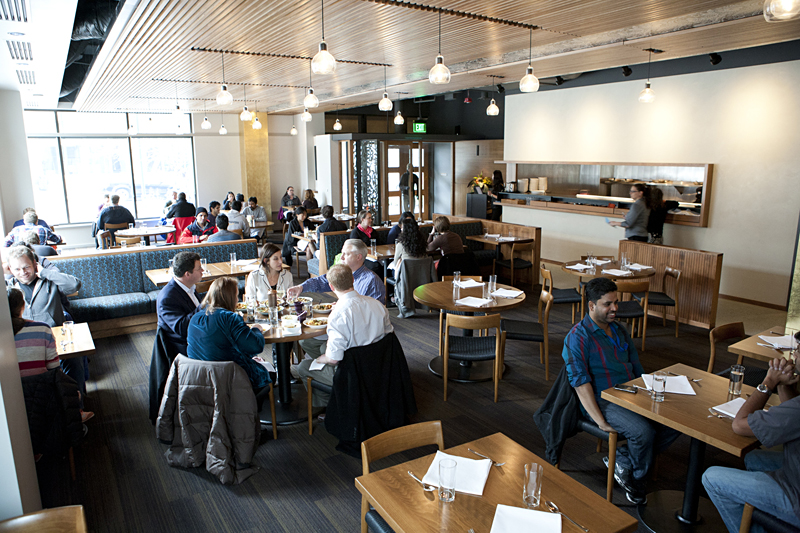The lifeblood of Mehak Indian Cuisine is delivery, as the Northgate restaurant’s interior makes abundantly clear. The sheer white curtains and tablecloths look as though they’ve been dipped in weak tea, the salmon-pink wall paint has faded to a canned-tuna hue, and the ratty Berber carpet isn’t perfectly flush with the floor. The dining room’s sparsely ornamented with a mirror and a coat stand, although a back room that a fancier restaurant might make its storage closet is crammed with cots, games, and a huge plastic tub of salty snacks. In addition to being a takeout hub, Mehak is a home.Yet guests who make the trek to Mehak anyhow will be rewarded by a warmth that can’t be exported in a Styrofoam box. When owner Mit Kaur brings a plate of chicken tikka masala to your table, she squeezes your shoulder with bear-hug intensity: “Welcome,” she says. Soon, perhaps, the two of you could be playing cards and eating pretzels.Kaur speaks English haltingly, but if you ask, she’ll lead you through her kitchen to the tandoor, a fiery clay pit with crooked disks of naan affixed to its inner perimeter like lichens on a log. Peeled from the oven, the chewy bread is as impressive as the ancient contraption that produced it, its uneven surface ridged with air bubbles and bruised with smoke. This is naan too good to spend on sauce-sopping.Shanik—which opened last December in South Lake Union, after what felt to Seattle’s food-fixated tribe like an excruciatingly long wait—serves naan too. Unlike Mehak, Shanik is a restaurant to be seen: At the back end of its boxy dining room is a conspicuously posh lounge, furnished with exposed light bulbs, an elaborately cut-out cornice, scrolling wooden benches, and darker wooden tables of the same squat height. The naan, though, is considerably less baroque. Shanik’s buttered triangles of prairie-flat bread taste like cut-rate pita that’s been frozen and thawed, then frozen and thawed again. It’s firm and flavorless, flaws not given much cover by the cold serving temperature. This is naan to make you sad.As great chefs who’ve tried charging double-digit prices for tacos have learned, there’s a collective American reluctance to pay serious money for dishes associated with the developing world. Folks like their pho and falafel cheap. But a series of accomplished restaurateurs—including Shanik’s Meeru Dhalwala, who co-owns Vancouver, B.C.’s critically acclaimed Vij’s with her husband, Vikram Vij—have helped diners understand there’s nothing oxymoronic about upscale Indian food. The cuisine’s sophistication is highly compatible with elegance and the price it commands.So there’s nothing theoretically wrong with a meal at Shanik costing four or five times as much as a meal at Mehak. What’s regrettable is that in elevating dishes that eaters may recognize from takeout containers and steam-table buffets, Shanik has left behind a certain soulfulness. With its dreadful service, mangled dishes, and often irrational insistence on modernity, the ambitious restaurant has snuffed out the compelling energy that emanates from traditional tandoors.The management team, always well represented on the floor when there wasn’t a server available to take a drink order or a busser around to clear the previous course’s plates, is apparently aware of the restaurant’s troubles: During my two visits, they hovered around the open kitchen, looking as concerned as Ravens fans during the third quarter of the Super Bowl. Dhalwala has also openly acknowledged problems, using her Twitter feed to apologize for equipment failures which hobbled Shanik’s soft opening and, three weeks later, to advertise for cooks and a head chef. No restaurant’s perfect out of the gate, of course. But it’s rare for a restaurant with such an estimable pedigree to underwhelm so radically after months of service.The Vij name and desirable location have conspired to keep Shanik very busy, and the restaurant’s slatted wooden ceiling doesn’t do much to muffle the crowd noise. On my first visit, the room’s decibel level measured 86 on my smart-phone app, which is slightly louder than heavy city traffic. Fortunately, my server wasn’t especially interested in carrying on an extended conversation. When I asked for recommendations, she zeroed in on an appetizer of sauteed onions and a short-rib entree. “So I’ll just put that in for you,” she announced, pulling out her iTouch order pad without waiting for my response. I asked instead for a few more minutes to consider the menu, an act of disobedience that inadvertently made me memorable.”Normally, I’d say that’s too much food,” the same server snarled when she took my return-visit order. “But I remember how much you packed away last time.”None of the other staffers I encountered was quite so contemptuous, but service issues abounded: One hapless runner was stuck with a plate of samosas that apparently didn’t belong to any of the tables he approached, while another reached around the used, stacked-up plates on our table to drop off more food. He left empty-handed.Still, the restaurant’s sloppy cooking is its ultimate undoing. Perhaps the best dish I sampled at Shanik was a griddled pura. Although its crowning tomatoes and onions were lost in a bacon haze, the crepe itself would be the pride of any Sunday-morning pancake flipper. But it was burdened with, as a server put it, “all the seasonings we use.” The cumin, turmeric, coriander, and cardamom were applied in bizarre proportion, making the dish as off-kilter as a string quartet with three double basses and a violin.A pile of Brussels sprouts, sauteed to the leaf-shedding point, probably made sense on a spreadsheet: With cashews for crunch, paneer for silkiness, bell peppers for acid, and the sprouts for bitterness, the dish should have worked. But without any spice to stitch together its components, the dish tasted flat. Undercooked short ribs, slathered with a mahogany-colored tomato-cream curry, would have benefited from a shake of salt. Overcooked salmon needed more zip than a sheer curry of coconut and ginger offered.Vegetarian dishes aren’t safe bets either: Paneer, barely noticeable in the background of the Brussels sprouts preparation, doesn’t have the star power to hold down a dish layered with tomatoes and onions. Instead, the dense, chalky cheese tastes like a co-op member’s first stab at homemade tofu. And rubbery deviled eggs are stuffed with a curry so gritty it sticks in your teeth.Better is the kale, jackfruit, cauliflower, and potato curry, which gains pop from a sprinkling of roasted almonds. Here, the sauce has a warm, appealing balance. All you have to do is resist the urge to dredge Shanik’s bum naan through it.hraskin@seattleweekly.comPRICE GUIDEDeviled eggs $11Pura $12Brussels sprouts $12Kale, jackfruit, cauliflower, and potato curry $16Salmon $24Short ribs $23
The lifeblood of Mehak Indian Cuisine is delivery, as the Northgate restaurant’s








